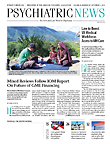$200 billion each year. That astounding figure might represent the annual cost of depression in the United States, according to a new systematic review encompassing more than 60 clinical studies and nearly 60,000 adult patients. At this price point, depression is more costly than cancer and diabetes, yet research on this disorder receives far less funding from the National Institutes of Health (NIH) than these other two diseases.
A significant chunk of these costs is attributable to patients who do not respond to their initial depression treatment; while representing only about 12 percent to 20 percent of all depression cases, these treatment-resistant individuals exact a far heavier toll. Depending on the exact prevalence, treatment-resistant depression in the United States costs up to $64 billion each year—nearly one-third of the total cost attributable to all individuals with depression.
This review, which was published online August 1 in Psychiatric Services in Advance, represents one of the first attempts to piece together various smaller studies on depression outcomes into a comprehensive picture.
As author John Hornberger, M.D., CEO and president of Cedar Associates, a health research organization in Menlo Park, Calif., told Psychiatric News, “As a general internist, I see patients across a broad spectrum of diseases. . . . There are clear differences among disciplines in the level of stigmatization associated with disease and public advocacy, and these differences influence the debate about health care and research priorities. With our study, we sought to understand better the burden of mental health, especially the patients who are most difficult to treat.”
Those patients with treatment-resistant depression showed higher incidences of other psychiatric conditions including fatigue, anxiety, psychoses, and suicidal thoughts; they also reported a substantially lower quality of life than patients who experienced a remission or improvement of their symptoms. These factors resulted in more doctors’ visits, more medication, more work missed, and, when put all together, more costs. And the extent of those costs was eye-opening.
Costs Plunge When Treatment Works
On average, the annual direct (health care) and indirect (productivity) costs for an individual with treatment-resistant depression were nearly double those of someone with treatment-responsive depression and nearly quadruple the annual health care costs for the general population ($20,120 vs. $10,592 vs. $5,095).
The authors noted that the study did not factor in the burdens of depression on friends, family, and caregivers, which likely raises the societal costs even more than the costs identified in this study, but not enough published data exist to factor those variables into the cost equation.
“Our study highlights how treatment-resistant depression creates a huge wake,” said Hornberger. “Perhaps more than any other disease, a mental health disorder disrupts every aspect of a person’s life and permeates every level of society, including medical care resources, school and work safety, employment opportunities and related work losses, and, not least, effects on family members.”
Jerry Halverson, M.D., medical director of adult services at Wisconsin’s Rogers Memorial Hospital–Oconomowoc and a member of APA’s Council on Advocacy and Government Relations, was not surprised by the results. “The findings perfectly underline what we as clinicians see every day,” he said in an interview. “Our patients have many physical and psychiatric comorbidities in addition to the depression, so they not only account for a proportionally higher percent of the health care spending, but their quality of life is often terrible—it makes everyday life for them that much more difficult.”
Small Changes Can Make Big Difference
Though the review focused on the big picture, Halverson noted that even small changes in clinician practices could be instrumental in helping lower the cost burden. “Psychiatrists can exert some control over the flow of costs in mental health through the treatments that they recommend, as I have seen through some claims-based modeling we are doing in Wisconsin. If psychiatrists prescribed generics just 10 percent more often, for example, that could save a great deal of money, which could then be spent on other programs that support our patients including social services.”
Improved efficiency and access will be needed, but resources are necessary too, Hornberger believes. “Yes, there are many generic drugs at our disposal, but the flip side of that coin is the declining rate of new drug development,” he said. “Innovation is still needed to solve the problem of this societal burden. That requires funding for basic research, clinical research, and translational research that leads to changes in clinical policy and effects meaningful changes in outcomes and costs.”
The disparity in costs versus NIH funding for depression research highlights the uphill battle facing mental health care, but Hornberger noted that a focus on lost productivity could bring more attention to depression’s huge influence. Compared with heart disease or cancer, for example, mental disorders have a lower average age of onset and thus are heavily prevalent among the workforce—disability or absenteeism alone contributed $6,924 in costs annually for each case of treatment-resistant depression, the review found.
This study was supported by Assurex Health through a research contract with Cedar Associates. ■
An abstract of “A Review of the Clinical, Economic, and Societal Burden of Treatment-Resistant Depression: 1996-2013” can be accessed
here.
